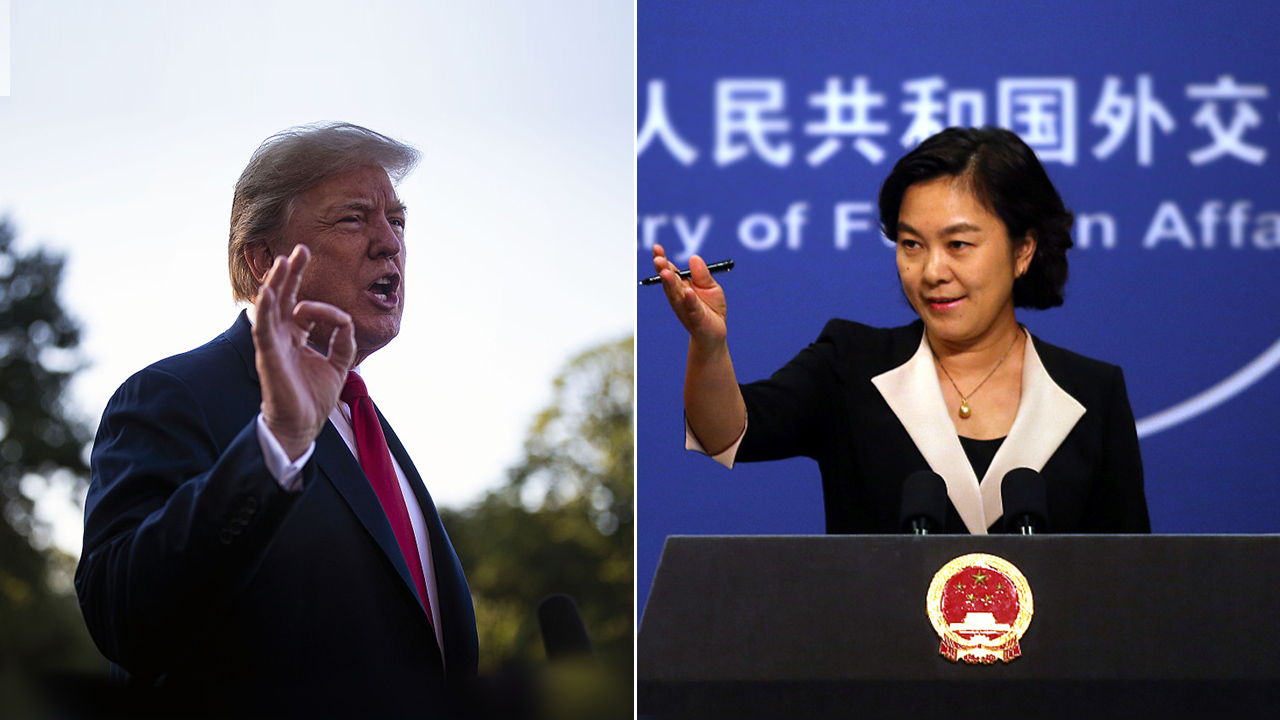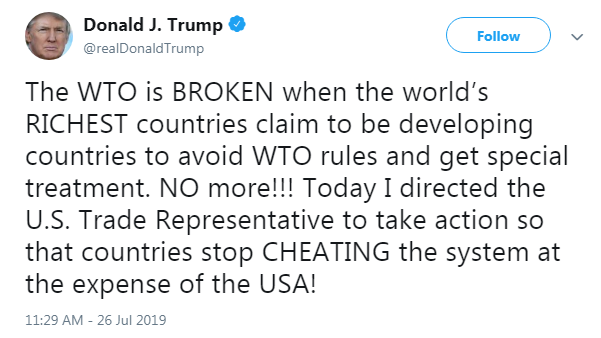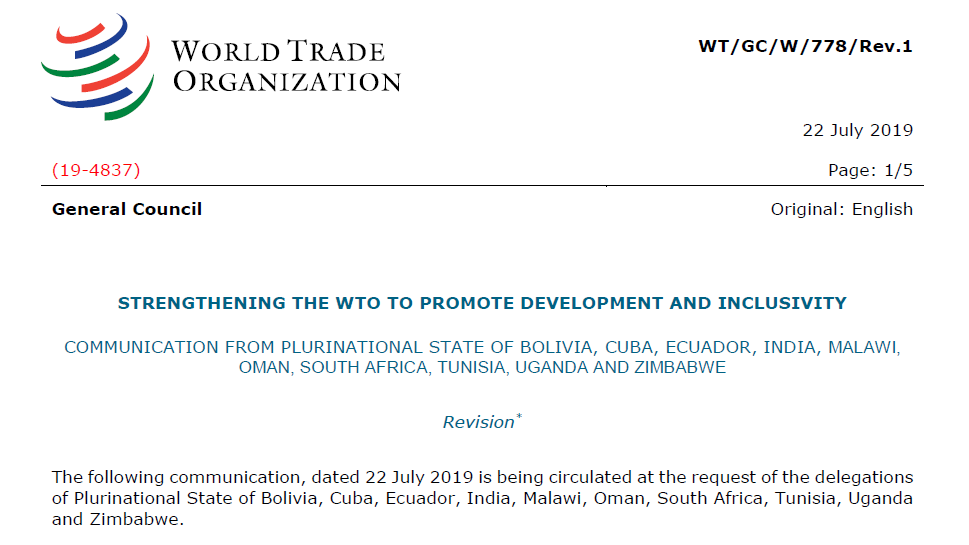

Beijing has reacted ferociously to U.S. President Donald Trump's threat against China's "developing nation" status at the World Trade Organization (WTO), saying the coercive move has exposed Washington's "arrogance and selfishness".
"When you hear the words and deeds of the U.S. on the status of developing countries in the WTO... They further reveal how capricious, arrogant and selfish the country is. Such are not worthy behaviors of the 'world's biggest power'," Chinese Foreign Ministry Spokesperson Hua Chunying said at a press conference in Beijing.
"First, the WTO is not owned or dictated by one or a few countries. Instead, the shared will of all members should be respected. In fact, many members have responded to this issue on various occasions. The 'special and differential treatment' [for developing nations] reflects the core values and basic principles of the WTO. Most members believe that such core values and basic principles must be safeguarded no matter how the WTO is reformed," she said.
"Previously the U.S. made two proposals similar to this memorandum to the WTO, but they were both rejected. It should have a better understanding of how unpopular its proposals are," Hua said, adding: "There is a catchphrase that got popular just recently in China, 'don't do things like the U.S. does'. I hope some people of the U.S. side can deeply reflect on it."
The Chinese response came after U.S. President Donald Trump on Friday threatened to unilaterally withdraw recognition of WTO's special "developing nation" status of China, India and other relatively rich countries if the global trade regulatory body didn't make changes in its rules for granting such status within 90 days.

A screenshot of U.S. President Donald Trump's tweet.
In a memo purportedly promoting WTO reform, the Trump administration stated the trade body uses "an outdated dichotomy between developed and developing countries that has allowed some WTO members to gain unfair advantages".
Without "substantial progress" to reform WTO rules within 90 days, Washington will no longer treat as a developing country any WTO member "improperly declaring itself a developing country and inappropriately seeking the benefit of flexibilities in WTO rules and negotiations," said the memo, which focused mostly on China, but also named India, Turkey, Vietnam and other nations in certain cases.
Hegemonic attempt
In response, the Chinese official questioned the authority of the U.S. to unilaterally dictate terms to the WTO, which she stressed was unacceptable.
"Who are the developing members of the WTO? By what criteria and procedure are they categorized? This is not decided by one or a few countries, either. It should be determined through extensive consultation among members. In particular, the opinions of developing countries should be respected," Hua remarked.
Insisting that fairness in trade can only be achieved by upholding the status of developing countries, she accused the US of exaggerating the development level of some developing nations. "This has been repeatedly opposed by most developing members. In a recent report, the UNCTAD (United Nations Conference on Trade and Development) proposed the idea that development is a multi-dimensional concept. The current categorization of developing countries is reasonable," she elaborated.
The foreign ministry spokesperson asserted that China, as the biggest developing country, will never shy away from its due international responsibilities. "It (China) is in fact upholding the basic rights of developing countries, which in itself is an act that champions international fairness and justice."
"In WTO negotiations, China will continue to make contributions proportionate to its capability and development level. We will continue to help other developing members to achieve common development, uphold the multilateral trading system and work to steer the WTO reform in the right direction," she added.
The clash of words came as the U.S. and China prepared for the latest round of trade talks in Shanghai beginning Tuesday aimed at resolving the ongoing trade dispute between the world's two largest economies.
Washington "obviously timed the memo to serve as a new bargaining chip" in the trade talks, Xinhua news agency stated in a commentary. "But the tactic of imposing pressure is nothing new to China and has never worked," it said. Xinhua added that the US government's "latest hegemonic attempt" to coerce the WTO "is destined to hit a wall of opposition".
China's status is undisputed
Experts suggested that Trump's latest attempt to coerce the WTO into changing its regulations will not be accepted by the developing countries, while maintaining that China’s status as a "developing nation” remains undisputed.
According to 2018 figures, China's population is more than four times that of the U.S., however the Asian country’s per capita income in nominal terms is less than one-sixth the size of the world’s biggest economy.
"China's aggregate economic data points to continued growth, but its per capita GDP is still relatively low," Wei Jianguo, China’s former vice-minister of commerce, was quoted as saying by China Daily.
Wei, who is currently the vice-president of Beijing-based think tank, China Center for International Economic Exchanges, added that China's economic structure has undergone major adjustments, but its industrial structure still illustrates a large gap compared with developed countries.
"Judging from many parameters including the per capita income indicator, the indicators of social development, and the indicators of regional development, there is still a considerable gap between developing countries and developed ones," Ruan Zongze, Executive Vice President, China Institute of International Studies, told CCTV, concurring with Wei.
Meanwhile other analysts felt that China's track record at the WTO has been exemplary and in many ways provides a road map to other developing nations.
"China hasn't used its identity as a developing country to evade its obligations and responsibilities. We are not like what some people in the U.S. who accuse China of being, an elephant hiding behind ants," Tu Xinquan, Head of China Institute for WTO Studies at the University of International Business and Economics told CCTV.
"We have taken many of these obligations and responsibilities beyond the level of many other developing countries. For example, our current average implemented tariff is only 7.5 percent, which is very close to the level of developed countries. China is a model for developing countries to follow in regards of fulfilling its obligations of openness," he added.
Joint proposal against unilateral action

A screenshot of the title page of the joint proposal for WTO reforms by India, South Africa and eight other countries. The proposal was endorsed by a majority of the members of the global trade body despite U.S. opposition. /CGTN Photo
Suggesting that the U.S. was isolated on the subject, Wei also noted how a majority of WTO members last Wednesday endorsed a joint proposal by India, South Africa and eight other countries for reforming the global trade body amid existential threats to the multilateral trading system.
"We saw a group of developing countries, including India, and South Africa, jointly proposed to the WTO and firmly upheld the principle of special and differential treatment for developing countries," Wei said citing the proposal that was also supported by China.
The proposal titled "Strengthening the WTO to promote development and inclusivity" called for the immediate resolution of the impasse at the highest adjudicating body for global trade disputes. In a veiled reference to repeated one-sided U.S. actions, it also called for prohibiting unilateral trade measures and asked for "development-centric" reforms that would strengthen the 164-member trade body.
Predictably, the U.S. staunchly opposed the joint proposal saying it will unravel the Uruguay Round agreements that established the WTO, according to multiple media reports. Despite Washington's opposition, several other industrialized countries, particularly Norway, supported the joint initiative saying it offers a way-forward for strengthening the WTO in the face of a sustained assault on multilateral trading system.
(With input from agencies)

Copyright © 2018 CGTN. Beijing ICP prepared NO.16065310-3
Copyright © 2018 CGTN. Beijing ICP prepared NO.16065310-3